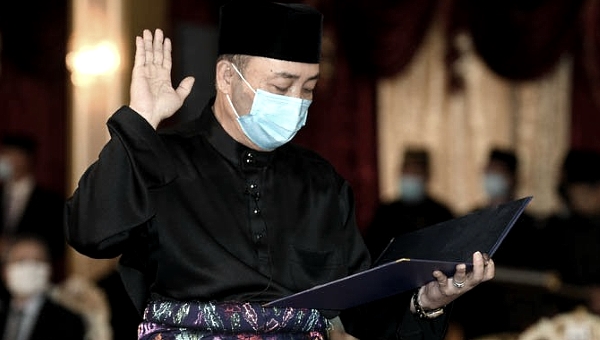
Sin Chew Daily
After Gabungan Rakyat Sabah (GRS) won the Sabah state elections, the limelight immediately fell on the candidate for the new chief minister. Umno and PPBM were deadlocked on the candidate but they somehow managed to strike a consensus by supporting PPBM's state chairman Hajiji Mohd Noor as the new CM.
Hajiji was subsequently sworn in on Tuesday while Umno's Sabah state liaison committee chairman Bung Moktar Radin, STAR president Jeffrey Kitingan and PBS vice president Joachim Gunsalam were appointed deputy chief ministers.
There are two things that warrant some serious attention under new Sabah political landscape.
First and foremost, the new state government will have no Chinese representation. The customary practice of having leaders of the state's three largest ethnic communities as deputy CMs is no more in existence.
A total of ten ethnic Chinese candidates were fielded by GRS in last week's elections, including in overlapping constituencies, but all of them were thrashed by Warisan Plus candidates. As if that's not enough, some even had their deposits forfeited. This shows that Warisan Plus is broadly supported by the local Chinese.
The flip side of the event is: Chinese Sabahans are left out in the government and the state cabinet will have zero Chinese representation.
In the past, Sabah's three DCM posts were respectively held by a Muslim bumiputra, a non-Muslim bumiputra and a Chinese. But things have changed now.
Chinese is the second largest ethnic community in Sabah and the state government should not neglect the voices of the local Chinese people, nor overlook the interests of the community. Chinese voters have the right and freedom to choose their representatives and such a right must be respected.
Sure enough the new state government can bring Chinese representatives into the cabinet through appointment in a bid to reddress this problem. This will not only reflect the administrative team's accommodativeness and tolerance but help enhance interaction and communication with the local Chinese community.
The second thing that we should take note of is that PPBM has begun building a strong presence and influence in the state. The party made inroads into Sabah only last year, and within such a short span of time has successfully absorbed Umno's people and won the CM throne!
Umno had been helming the Sabah administration since the CM rotation system was abolished, until the 2018 general elections.
In the latest state elections, Umno won the most seats among GRS parties at 14, three more than PPBM. But if we go by the alliances under GRS, then PPBM's Perikatan Nasional was leading at 17. Umno was initially very firm in claiming the CM post but eventually gave in to PPBM.
And this concession gives PPBM vast potentials to expand its presence in Sabah. If the party seizes this unique opportunity to significantly expand its presence in the state, it will then be extremely hard for Umno to control PPBM in the state in future.
Influences of the new Sabah political landscape are not confined solely to the state. The increasingly powerful PPBM will be a real threat to Umno, and it is yet to be seen whether the Sabah CM issue will have a bearing on the two parties' cooperation on the national level.
ADVERTISEMENT
ADVERTISEMENT


































